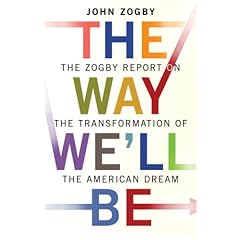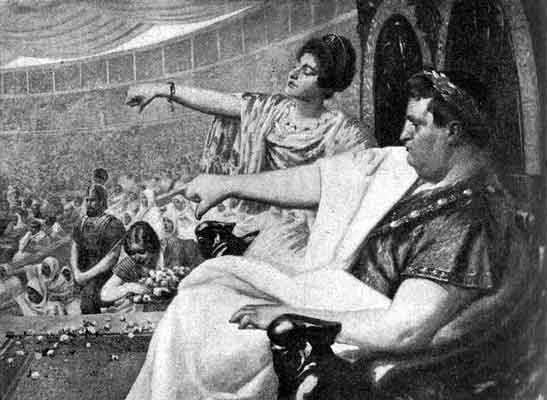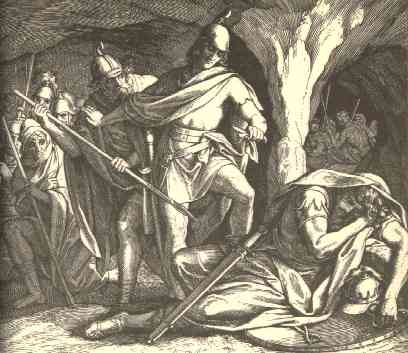Ideas Have Histories: Where Postmodernism Came From-Part I
/This is part one of two articles on Postmodernism
By John Stonestreet, Summit Ministries
 Postmodernism comes in all kinds of shapes and expressions, and this sort of variety can make it difficult to understand. Further, postmodernism resists categories and distinctions, and this makes it more difficult to nail down as a worldview. There is a larger intellectual history that must be understood in order to grasp the uniqueness and significance of postmodernism as a worldview.
Postmodernism comes in all kinds of shapes and expressions, and this sort of variety can make it difficult to understand. Further, postmodernism resists categories and distinctions, and this makes it more difficult to nail down as a worldview. There is a larger intellectual history that must be understood in order to grasp the uniqueness and significance of postmodernism as a worldview.
Ideas Have Histories: How We Lost Our Minds…
While dividing history into distinct time periods is not an exact science, there are two major historical transitions that can help us clarify the emergence of postmodernism: (1) the transition towards modernism, typically dated around the 1700s and (2) the transition away from modernism which began in the late 20th century.
The transition from what is often called the pre-modern period into the modern period corresponds with the influence of Enlightenment thinking and the scientific revolution. Prior to the Enlightenment, there was a dominant cultural belief in the existence of the supernatural. This was due in large part to the rise of Christianity and specifically the Roman Catholic church as the most powerful cultural presence in medieval times. This was a world of authority, and authority rested in the hands of traditional institutions, especially the church, since it was entrusted with interpreting and communicating this truth to the common person.
With a belief in God came a strong belief in the concept of revelation, that God not only existed but had revealed Himself and His will in the Bible. This revelation was considered the primary source of truth, and could be trusted to unlock God’s metanarrative (or, “Big Story”) for the world. Believing was the starting point of real knowledge. St. Anselm, typifies a pre-modern perspective on truth: “For I seek not to understand in order that I may believe; but I believe in order that I may understand, for I believe for this reason: that unless I believe, I cannot understand.” This view of revelation and authority did not fare well during the Enlightenment.
The Enlightenment was a movement among European intellectuals in the 17th and 18th centuries. In the decades leading up to this time, the church’s authority had been successfully challenged politically (reactions against corruption), theologically (Luther, Calvin and the Protestant Reformation), philosophically (downfall of scholasticism), and scientifically (Galileo, Copernicus, and Baconian method). There was a growing disillusionment with the traditional educational, political and religious institutions, as well as their authoritative sources.
During the Enlightenment, authority shifted from traditional institutions to human reason. A scientific approach to the world yielded tremendous advances in medicine, technology, and communications and challenged the centrality of theology and religious belief as the paradigm for learning. Free from the restrictive shackles of traditional beliefs (thus, modernism), progress seemed inevitable. Immanuel Kant described this period of time in this way: “Sapere aude! ‘Have the courage to make use of your own mind!’ is thus the slogan of the Enlightenment.”[1]
The modern period had begun. The growing skepticism in regards to anything supernatural was matched by growing faith in human ability to know the world, control it, and reap the inevitable benefits. The “Big Story” of the world was not given by revelation; rather, it was to be discovered and perhaps even determined by science, reason and technology. This major transition was at the heart of the modern period.
However, from our 21st century perspective, it is clear that the predictions of utopia guaranteed in the modern period never materialized. Instead, modernists became disillusioned as military increase brought world wars; failed development policies led to class oppression and colonialism; economic idealism resulted in communism and the Cold War; and our best science created nuclear weapons and the threat of global devastation.
Postmodern writers, beginning with Nietzsche, began to question the integrity of modernism’s metanarrative of progress. In fact, the main casualty of a postmodern perspective is the very idea of a metanarrative. Postmoderns are skeptical of any and all claims to an authoritative comprehensive worldview, absolute truth about reality, and an overarching purpose to the human story.[2] Postmoderns embrace local narratives, not metanarratives; a multitude of stories, not a “Big Story.”
In short, it could be said that religious metanarratives were dismissed by modernism. Man-made ones are dismissed by postmodernism. This is what Myron Penner and others have referred to as “the postmodern turn:”[3] postmodernism is a turn away from the certainty and optimism of modernism. As Jean Francios Lyotard wrote: “Simplifying to the extreme, I define postmodern as incredulity toward metanarratives.”[4]
Answering the Postmodern Challenge
Postmodernism’s impact on Western culture is hotly debated, and various thinkers and writers- including those coming from a Christian worldview- have offered diverging opinions of it. Some see it as a passing fad; others see it as long-lasting paradigm shift. Some decry it as dangerously destructive; others embrace its destruction of the oppressive structures of modernity.
The most helpful contribution of postmodernism is, first, that it has successfully challenged the reigning paradigm of the modern period, which was based largely on naturalistic humanism. Modernism, in seeking to arrive at absolute knowledge through empirical investigation, separated matters of “faith” from matters of objective knowledge about the real world. Postmodernism confronts this dichotomy in ways that are helpful for the Christian worldview.
Second, postmodernism has cast a large shadow of skepticism (and has offered a strong dose of humility) on the modern belief in the efficacy and near inerrancy of human reason. As was seen during the modern period, human reason can be quite productive, especially in the arenas of science, medicine, and technology. However, human reason can also be manipulative and destructive, especially when it produces the totalizing ideologies (e.g. communism, Nazism, colonialism, etc) that characterized the modern period.
Third, postmodernism has demonstrated that objectivity and certainty are not exclusive to the realm of science as was claimed during the modern period. In fact, science is often quite biased and agenda-driven, and is therefore in no place to claim to be the final arbiter on all matters of knowledge. This is especially helpful for Christians, who often feel the burden to play by the rules of modernism and empirically demonstrate every aspect of Christian truth.
Fourth, postmodernism rightly reminds us of the power of our culture, and especially the language of our culture, in creating our frames of reference. The modern period demonstrated that this power can be used to marginalize and oppress others at the personal and the systemic level. For the Christian, then, care should be taken to distinguish Scriptural teaching from our cultural perceptions.
Finally, the emphasis of postmodernism on story and narrative fits (to a limited extent) with the way the Bible presents God’s interaction with the world. The Bible is, on the whole, a narrative through which God gives us the Truth about Himself, humanity and the world. Of course, for the postmodernist, no story is to be considered true in this absolute sense over and above any other story, and propositions from one interpretive community are irrelevant for others.
The Bible does not present a God whose story is one among many, but a God whose story is the story above all others. So, in dealing with the postmodern mind, evangelicals face a difficult situation. For the past several centuries, modernity has relegated Christianity to the category of an unscientific, unrealistic worldview that is simply not believable for thinking people. Some Christians are tempted to settle for having Christianity accepted as a truth rather than face the prospect of being dismissed due to dogmatically claiming to be the truth, and abandoning the concept of worldview seems to be a small price to pay for having at least some claim to “truth.”
Although the dethroning of humanistic scientific reason is attractive to battle-weary Christian intellectuals, the postmodern denial of all objective truth is unacceptable.
Further, it is important to note that none of the positive contributions of postmodernism originated with postmodernism! In fact, the Christian worldview has always attested to the limitations of unaided human reason, the effect of the fall on objectivity and certainty, the tendency of humans towards marginalizing others, and the role the concept of story plays in our experience.
Despite the popularity of postmodernism among many Christians, the Christian worldview and the postmodern worldview cannot co-exist without one capitulating to the other. One could argue that we are chronologically “postmodern;” but ideologically, we cannot become “postmodernists.”
[1] Immanual Kant, “An Answer to the Question ‘What is Enlightenment?’” available online at http://www-personal.ksu.edu/~lyman/ english233/Kant-WIE.htm, accessed 08/30/2009.
[2] David Wells, Above All Earthly Powers: Christ in a Postmodern World (Grand Rapids, Mich: Eerdman’s, 2005), 74–90.
[3] Myron Penner, “Introduction” in Penner, Christianity and the Postmodern Turn: Six Views, 19–28.
[4] Jean Francois Lyotard, The Postmodern Condition: A Report on Knowledge trans. Geoff Bennington and Brian Massumi, in Theory and History of Literature, vol. 10 (Minneapolis: Univ. of Minnesota Press, 1984).

 Where is our country headed? What are the trends that will shape American culture? These are the questions that John Zogby, CEO of
Where is our country headed? What are the trends that will shape American culture? These are the questions that John Zogby, CEO of  "Green" is more than a good slogan ... the young especially have internalized sustainability as a life goal, and that's true across the planet.
"Green" is more than a good slogan ... the young especially have internalized sustainability as a life goal, and that's true across the planet.  just their community or nation on earth. The young think and buy globally (patriotism will not sell products), and they are sensitized to global issues from human rights to AIDS and poverty, even though they might not always command the facts.
just their community or nation on earth. The young think and buy globally (patriotism will not sell products), and they are sensitized to global issues from human rights to AIDS and poverty, even though they might not always command the facts.  who believe that the American dream is measured in spiritual, not material, fulfillment.
who believe that the American dream is measured in spiritual, not material, fulfillment. 
 The America of 2020 will be a more tolerant nation.
The America of 2020 will be a more tolerant nation.  My surveying shows that we are in the middle of a fundamental reorientation of the American character, away from wanton consumption and toward a new global citizenry in an age of limited resources.
My surveying shows that we are in the middle of a fundamental reorientation of the American character, away from wanton consumption and toward a new global citizenry in an age of limited resources. 

 Let me share a story with you. When my oldest daughter was about seven or eight years old I remember walking past the den and hearing my daughter pointing at the TV and asking with big saucer eyes, "daddy, is that the bad man?!" She was anxiously pointing at President Clinton.
Let me share a story with you. When my oldest daughter was about seven or eight years old I remember walking past the den and hearing my daughter pointing at the TV and asking with big saucer eyes, "daddy, is that the bad man?!" She was anxiously pointing at President Clinton.  When Peter wrote those words, Nero was the emperor of Rome.
When Peter wrote those words, Nero was the emperor of Rome.  impact for good or evil, it is the character of individual citizens that ultimately determines the character of any country. More than a good president, we need powerful faithful pulpits, godly families, and strong Christian schools. Pray that the Lord's Spirit will blow throughout our land bringing with Him revival and deep rooted reformation.
impact for good or evil, it is the character of individual citizens that ultimately determines the character of any country. More than a good president, we need powerful faithful pulpits, godly families, and strong Christian schools. Pray that the Lord's Spirit will blow throughout our land bringing with Him revival and deep rooted reformation. So David persuaded his men with these words and did not permit them to attack Saul ...
So David persuaded his men with these words and did not permit them to attack Saul ...  As a Christian community we have the same opportunity. Instead of moaning, complaining, predicting the apocalypse, the end of civilization as we know it and verbally assailing and demeaning the President Elect, we have the opportunity to show watching students and a watching world
As a Christian community we have the same opportunity. Instead of moaning, complaining, predicting the apocalypse, the end of civilization as we know it and verbally assailing and demeaning the President Elect, we have the opportunity to show watching students and a watching world 
 applies to how Christians should be responding to public policy issues in a constructive Christ honoring fashion--regardless of who occupies the White House.
applies to how Christians should be responding to public policy issues in a constructive Christ honoring fashion--regardless of who occupies the White House. 




